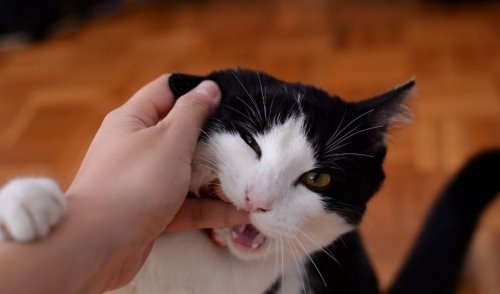
Why Does Your Cat “Love” Bite?
Cats have a reputation for being temperamental and finicky, and never is that more apparent then when your seemingly gentle, contented kitty suddenly and unexpectedly bites, with no obvious explanation or trigger. What do these “love” bites really mean?
What Is a Love Bite?
A love bite is a gentler bit, nip, or nibble, one that doesn’t typically break the skin. These bites aren’t usually accompanied by other obvious warning signs, such as raised fur or growling, though there may be subtle body clues just before a cat nips. A love bite isn’t too hard but can still be startling and painful, as cats’ teeth are sharp. These bites are most common during a petting session, when the cat may otherwise seem at ease and comfortable. Love biting is a common behavioral problem with many cats, but understanding this behavior can help cat owners better understand their pet and what it is trying to communicate.
Why Cats Love Bite
Despite its name, a love bite is not usually considered a sign of affection. Instead, these nips are a cat’s instinctive reaction to soreness, surprise, or discomfort. For some cats that can’t tolerate petting as well, for example, over-stimulation of the hair follicles during a lengthy petting session can become quite painful, and the cat’s bite is a way of interrupting and stopping the attention. This is simply part of the cat’s body language, indicating that it is done with the interaction and getting irritated. Any cat may love bite on occasion, particularly if they are feeling stressed, may be in pain (such as if petting inadvertently touches a cut or rash), or if other body signals aren’t heeded.
Other types of love bites can be related to energetic play. Cats are instinctive hunters, and if vigorous play and excessive energy aren’t safely directed, the cat may bite in the heat of the moment. It isn’t an aggressive attack, but rather another type of overstimulation. This is most common with energetic kittens and young cats that are still refining their hunting techniques.
Reacting to Love Bites
It can be painful when a cat love bites, because even though the bite is not at full strength, a cat’s teeth are sharp and its jaw pressure can be powerful. This is especially true when a cat may bite on areas where skin is thinner and nerves are closer to the surface, such as hands, fingers, or cheeks.
When a cat bites, the instinctive reaction is to quickly move the hand away. This can trigger the cat’s hunting impulses, however, as prey would try to run from a hunting cat and the visual stimulation of a quick reaction can lead to a deeper, more dangerous bite. Instead, freeze very still and let the cat disengage, then calmly and slowly move away. Stop whatever behavior – petting, playing, etc. – led to the bite, and allow the cat to resume its activities calmly.
Above all, do not physically retaliate to a cat’s love bite by grabbing, shaking, or striking the animal. This type of reaction is counter productive and will only serve to heighten a sense of distrust and miscommunication between cat and owner. Furthermore, a harsh reaction could escalate the cat’s behavior to deeper bites, scratches, and other aggressive behavior that will be even more difficult to control.
If your cat has bitten you, check your skin carefully, and even if the skin has not been broken, wash the area thoroughly with antibacterial soap and warm water. Cats can carry a range of bacteria and microbes, some of which can infect humans with potentially dangerous diseases. Keep a close watch on the bitten area for several days, and seek medical care if you notice any swelling or redness.
Avoiding Love Bites
Learning your cat’s body language is the best way to avoid love bites altogether. Get to know your cat’s tolerance for petting and other close contact, and stay alert to warning signs such as tensing skin or muscles or a twitching tail. Allow your cat to initiate contact with you when it wants to be petted rather than surprising or startling a sleeping animal, and pet only the areas where your cat enjoys contact the most, such as around the ears or under the chin. You can also work to clicker train your cat, play games with laser pointers or feather toys, or provide climbing perches and cat trees to allow a cat to work off its excess stress and energy in safe ways that won’t involve love bites.
If love bites are a constant problem, or if your cat suddenly starts biting much more than usual, consult your veterinarian for assistance. It may be that your cat is trying to communicate about a larger problem, and seeking a professional diagnosis can help you ensure your cat has the best care without needing to direct your help one bite at a time.
